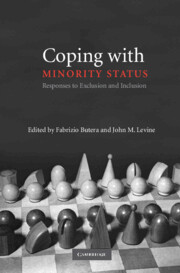Book contents
- Frontmatter
- Contents
- Contributors
- Introduction
- PART I COPING WITH EXCLUSION: BEING EXCLUDED FOR WHO YOU ARE
- PART 2 COPING WITH EXCLUSION: BEING EXCLUDED FOR WHAT YOU THINK AND DO
- 6 Delinquents as a minority group: Accidental tourists in forbidden territory or voluntary emigrées?
- 7 Minority-group identification: Responses to discrimination when group membership is controllable
- 8 Coping with stigmatization: Smokers' reactions to antismoking campaigns
- 9 Terrorism as a tactic of minority influence
- 10 The stigma of racist activism
- 11 Why groups fall apart: A social psychological model of the schismatic process
- PART 3 COPING WITH INCLUSION
- Index
- References
7 - Minority-group identification: Responses to discrimination when group membership is controllable
Published online by Cambridge University Press: 05 June 2012
- Frontmatter
- Contents
- Contributors
- Introduction
- PART I COPING WITH EXCLUSION: BEING EXCLUDED FOR WHO YOU ARE
- PART 2 COPING WITH EXCLUSION: BEING EXCLUDED FOR WHAT YOU THINK AND DO
- 6 Delinquents as a minority group: Accidental tourists in forbidden territory or voluntary emigrées?
- 7 Minority-group identification: Responses to discrimination when group membership is controllable
- 8 Coping with stigmatization: Smokers' reactions to antismoking campaigns
- 9 Terrorism as a tactic of minority influence
- 10 The stigma of racist activism
- 11 Why groups fall apart: A social psychological model of the schismatic process
- PART 3 COPING WITH INCLUSION
- Index
- References
Summary
In any given era, there may be a widespread consensus concerning what groups are seen as deserving of negative treatment. Indeed, such social-group memberships can represent a negative identity for those who are categorized as “one of them” (e.g., murderers, child abusers, smokers; see Crandall, Eshleman, & O'Brien, 2002). Likewise, groups that are consensually agreed upon as being positive (e.g., volunteer groups) have the potential to confer a positive social identity on their members. Social psychologists have assumed that a basic human desire to achieve and maintain a positive identity motivates people to seek membership in groups that are seen as positive and to avoid membership in groups that are seen as negative (Cialdini et al., 1976; Tajfel & Turner, 1979). Because people derive their identity in part from the groups to which they belong, it might seem, at first glance, to be rather contradictory to this central tenet in the field to find that some people remain loyal to groups that are seen as negative by other social groups or by society as a whole. Yet, clearly, many people choose to belong to a group even though they know they may face discrimination as a result.
What is more, we can point to many examples of people joining groups fully aware that this may make them vulnerable to discrimination (e.g., joining a feminist group or gay rights movement). In some extreme cases, people might even join such groups precisely because of their devaluation by the powers that be.
Information
- Type
- Chapter
- Information
- Coping with Minority StatusResponses to Exclusion and Inclusion, pp. 155 - 176Publisher: Cambridge University PressPrint publication year: 2009
References
Accessibility standard: Unknown
Why this information is here
This section outlines the accessibility features of this content - including support for screen readers, full keyboard navigation and high-contrast display options. This may not be relevant for you.Accessibility Information
- 10
- Cited by
